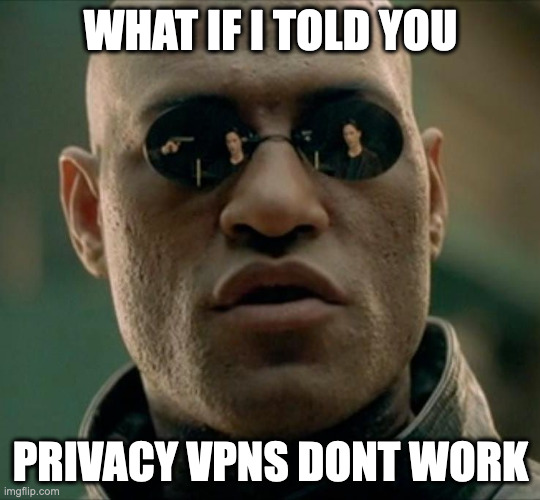Estimated Read Time: 5 min

Targeted ads were cool when they first appeared in around 2006. Now, they are just creepy. So you buy a privacy VPN like Nord or Mullvad, hoping that the targeted ads will decrease. At best you manage to trick YouTube into showing you an ad in a different language, at worst, the VPN gets in the way of daily work:
- Your banking won’t work
- You get increased number of captchas
- You can’t connect to the coffee shop’s wifi due to the privacy vpn is blocking their captive portal to ge on the wifi.
- and the list goes on …
In this article, I will tell you why privacy VPNs probably won’t work for you, and I will tell you what you can do instead.
Background: What does a Privacy VPN do and Why do I need one?
A privacy VPN hides the user’s IP from the destination website by proxying the connection through the privacy VPN’s networks. Privacy VPN providers claim if you hide your IP you can avoid tracking online which is simply not true.
Reason 1: Third Party Cookies are Dead
The need to track users across websites was greatly diminished by the sunseting of third party cookies. What is third party cookies and what do they have to do with your IP address? Third Party cookies is pieces of information that websites would stick in your browser that would follow you around and track what websites you would visit. Eventually, a user would clear cookies in their browser. Next time the user launched the browser, a new cookie would be set. So how can the ad tracking cookie know to whom this new fresh tracking cookie belonged to? Yes, it would use your IP address.
Reason 2: “The Big Problem”
Today, social platforms and content are intimately connected with each other. Let’s take Reddit as an example. “the front page of the internet”. There is no need for Reddit to track you across websites to serve relevant ads because a user’s social network together with engagement analytics is a much better predictor than what previous websites you visited would ever be.
Reason 3: Google is in your Phone

I was surprised when I looked at the market share that Android holds in 2024. The above graph shows that Google has 70% of the market in 2024. To get into the app store you need a Google account. If you have a google account on your phone, it’s game over for your internet privacy. There’s a freakin GPS tracker on those devices. Hiding your IP here will do 0 for your privacy online.
Summary:
- Third Party cookies are dead. This type of tracking is where knowing the IP address of the tracked browser was most useful.
- “The Big problem” with social networks for privacy is that it makes accurate tracking easy and the need for static indicators like IP irrelevant as the website uses your account as their static indicator.
- Most users are on Android which requires a google account to use which makes the need for other static indicators irrelevant.
Tracking in 2024 is much different from tracking in 2006 and as I have explained, IP addresses for tracking is not as relevant anymore. However, Privacy VPNs have other applications like circumventing geoblocking of Netflix content. So what can you do for your privacy online?
What should I Do Instead?

That depends on how deep down the privacy rabbit hole you want to go : )
- Read a book, easy solution
- Hide your IP for free with the Tor Browser
- If you have to use google, use multiple accounts.
- Don’t use Chrome
- Use federated social media like https://lemm.ee/ or https://mastodon.social
How to run a Tor Exit Node
In my coming article I will show you how to setup a tor exit node which will effectively turn your home network into your own privacy vpn connection.
Further reading
TBA